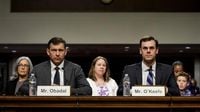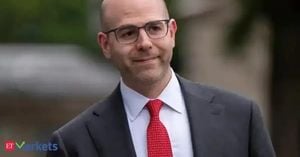On May 8, 2025, two significant events unfolded in Washington that showcased the complexities of U.S. governance and international trade under the Trump administration. In a Senate Armed Services Committee hearing, Michael Obadal, the nominee for undersecretary of the Army, faced tough questions regarding his ties to Anduril, a defense technology company. Meanwhile, President Donald Trump touted what he called a 'tremendous trade deal' with the United Kingdom, which has drawn skepticism from various observers.
During the Senate hearing, Senator Elissa Slotkin (D-Mich.) raised concerns about the ethical implications of Obadal's continued association with Anduril, particularly in light of the Army's transformation initiative that heavily focuses on drones and advanced technology. "I don’t have an inherent problem with the transformation. I just have a problem with the idea, the perception to our troops that their leaders can do things that they themselves cannot," Slotkin stated, emphasizing her worries about potential conflicts of interest.
Obadal, who has served nearly three decades in the Army before joining Anduril as a senior director, disclosed that he holds between $250,000 and $500,000 in vested restricted stock with the company, along with an equal amount in unvested stock. He assured the committee that he plans to adhere to guidelines established by the Office of Government Ethics (OGE) while managing his financial interests. "My restrictions and my recusals are laid out in my agreement with the OGE," he told the senators. He also confirmed he would divest from the unvested equity if confirmed for the Army position.
As the potential Army undersecretary, Obadal would be responsible for managing the service's budget and weapon investment decisions, a role that may directly impact Anduril’s business interests given the company’s involvement in the Army's push towards unmanned technology. Anduril is currently vying for contracts related to the Next Generation Command and Control (NGC2) initiative and has recently taken over a major contract from Microsoft for the Army's Integrated Visual Augmentation System (IVAS), valued at $22 billion.
Senator Richard Blumenthal (D-Conn.) echoed Slotkin's concerns during the hearing, while Senator Elizabeth Warren (D-Mass.) took a more direct approach, sending a letter to Obadal urging him to divest from his defense contractor equity and to recuse himself from matters involving his former clients for four years. "By attempting to serve in this role with conflicts of interest, you risk spending taxpayer dollars on wasteful DoD contracts that enrich wealthy contractors but fail to enhance Americans’ national security," Warren wrote, highlighting the potential risks of Obadal's dual roles.
On the same day, President Trump made headlines by announcing what he described as a 'tremendous trade deal' with the UK during a press event in the Oval Office. However, many critics were quick to point out that the so-called deal is merely a framework for future negotiations rather than a finalized agreement. The framework aims to expedite American goods through UK customs and reduce barriers on billions of dollars in exports, including agricultural products like beef and ethanol.
Despite the optimistic rhetoric from the White House, the announcement raised eyebrows, as it lacked concrete details on how it would achieve key objectives such as raising revenue or reshoring manufacturing jobs back to the United States. Observers noted the similarities between this announcement and the plot of the 1990s sitcom Seinfeld, which was famously described as a show about nothing. The comparison serves to illustrate the skepticism surrounding the efficacy of the trade framework.
As negotiations are set to continue, it remains unclear how long it will take to finalize the agreement. Trade deals often require extensive discussions and adjustments, and the timeline could stretch into months or even years. This uncertainty has left some questioning the real impact of the announcement on American businesses and workers.
Both events on May 8, 2025, reflect the challenges that the Trump administration faces in navigating complex ethical considerations and international trade dynamics. As Michael Obadal's confirmation hearing continues and negotiations with the UK unfold, the implications of these developments will likely resonate throughout the political landscape.
In conclusion, the intersection of military leadership and international trade under the Trump administration reveals the intricate balance of interests, ethics, and national security that defines contemporary governance. The outcomes of these events could have lasting effects on both the U.S. military's direction and its economic relationships abroad.




